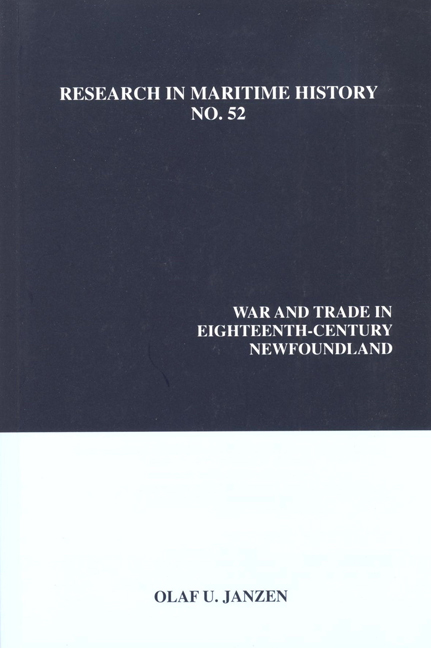Book contents
- Frontmatter
- Table of Contents
- About the Author
- Introduction
- “‘A World Embracing Sea:’ The Oceans as Highway, 1604-1815”
- “Of Consequence to the Service:' The Rationale behind Cartographic Surveys in Early Eighteenth-Century Newfoundland”
- “The Problem of Piracy in the Newfoundland Fishery in the Aftermath of the War of the Spanish Succession”
- “A Scottish Sack Ship in the Newfoundland Trade, 1726-1727”
- “'Une petite Republique' in Southwestern Newfoundland: The Limits of Imperial Authority in a Remote Maritime Environment”
- “The Illicit Trade in English Cod into Spain, 1739-1748”
- “Un Petit Dérangement: The Eviction of French Fishermen from Newfoundland in 1755”
- “The French Raid upon the Newfoundland Fishery in 1762: A Study in the Nature and Limits of Eighteenth-Century Sea Power”
- “Showing the Flag: Hugh Palliser in Western Newfoundland, 1763-1766”
- “The Royal Navy and the Interdiction of Aboriginal Migration to Newfoundland, 1763-1766”
- “The Royal Navy and the Defence of Newfoundland during the American Revolution”
- “The American Threat to the Newfoundland Fisheries, 1776-1777”
- Appendix
Introduction
- Frontmatter
- Table of Contents
- About the Author
- Introduction
- “‘A World Embracing Sea:’ The Oceans as Highway, 1604-1815”
- “Of Consequence to the Service:' The Rationale behind Cartographic Surveys in Early Eighteenth-Century Newfoundland”
- “The Problem of Piracy in the Newfoundland Fishery in the Aftermath of the War of the Spanish Succession”
- “A Scottish Sack Ship in the Newfoundland Trade, 1726-1727”
- “'Une petite Republique' in Southwestern Newfoundland: The Limits of Imperial Authority in a Remote Maritime Environment”
- “The Illicit Trade in English Cod into Spain, 1739-1748”
- “Un Petit Dérangement: The Eviction of French Fishermen from Newfoundland in 1755”
- “The French Raid upon the Newfoundland Fishery in 1762: A Study in the Nature and Limits of Eighteenth-Century Sea Power”
- “Showing the Flag: Hugh Palliser in Western Newfoundland, 1763-1766”
- “The Royal Navy and the Interdiction of Aboriginal Migration to Newfoundland, 1763-1766”
- “The Royal Navy and the Defence of Newfoundland during the American Revolution”
- “The American Threat to the Newfoundland Fisheries, 1776-1777”
- Appendix
Summary
I am flattered to have been invited to reprint a selection of my papers over the course of nearly thirty years, and I am grateful to the series editor of Research in Maritime History and to the International Maritime Economic History Association for encouraging me to accept that invitation.
The papers presented in this volume are not arranged in the order in which they were written and published. Rather, I have placed them in an approximate order of historical chronology in the belief that this will give the volume greater coherence and value. Allow me therefore to explain how they came to be written, and perhaps why.
My interest in eighteenth-century Newfoundland began as a graduate student at Queen's University in Kingston, Ontario, Canada. I was drawn there in 1971 by George Rawlyk who had published on the concept of “revolution rejected.” This refers to the fact that, while many of the British American colonies declared their independence from Great Britain in 1776, a few – either through circumstance or choice – did not. The result was a graduate essay on Newfoundland's response to the American Revolution. At the same time, I came under the tutelage of Donald Schurman, who was then also teaching at Queen's in the field of military and naval history and theory. These were serendipitous developments, for Rawlyk more than any other was responsible for my application to Memorial University's Corner Brook campus, where I have worked to this day, while Schurman more than any other was responsible for mentoring what skills I can claim as an historian. Both served as supervisors of my doctoral dissertation.
That dissertation expanded on the graduate paper I had written for George Rawlyk. My original intention had been to evaluate the nature and effect of American privateering activities in Newfoundland waters during the American War of Independence. I conceived it as a Newfoundland equivalent to John Dewar Faibisy's dissertation on American privateers in Nova Scotia during that same conflict. It had been Faibisy's contention that American privateers disrupted communications and movement sufficiently in Nova Scotia to impair that colony's ability to develop a capacity, one way or another, to respond in a united way to the issues of the American Revolution. Might this also have been the case in Newfoundland?
- Type
- Chapter
- Information
- War and Trade in Eighteenth-Century Newfoundland , pp. 1 - 6Publisher: Liverpool University PressPrint publication year: 2013

